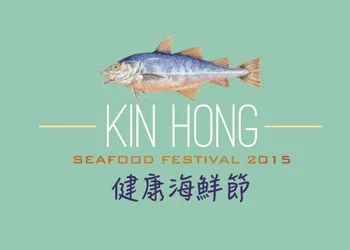
‘Kin Hong' festival points way to sustainable seafood consumption
At least 30 restaurants took part last month in the Kin Hong Seafood Festival in Hong Kong.
“Kin Hong” means ‘healthy’ in Cantonese, and it reflects the need for healthy seafood, starting from the healthy process of fishing or cultivation.
The restaurants participating in the event committed to providing at least one certified sustainable seafood dish in their menus.
According to the organisers, Ocean Recovery Alliance and ADM Capital Foundation, the festival aimed “to involve seafood retailers, consumers, restaurateurs and suppliers in creative events that will provide education about seafood sustainability”.
The event also provided an opportunity for the public to experience sustainable products first hand — through the participating restaurants and catering companies.
At the same time, the festival aimed to help restaurateurs access sustainable seafood so as to increase their availability and visibility in the marketplace.
Among the restaurants and related organisations that pledged their support to the event were Four Seasons Hotel Hong Kong, Grand Hyatt Hong Kong, Café Gray, Sohofama, Café Deco, Ocean Park, University of Hong Kong, Hong Kong Jockey Club, The Continental, and The Landmark — Mandarin Oriental.
The event was a timely reminder — and forewarning — of the need for sustainable fish consumption.
While pollution and water quality are partly responsible, overfishing is actually the main culprit behind the depletion of the world’s marine resources.
The festival organisers highlighted the findings from a new study, Taking Stock and Projecting the Future of South China Sea Fisheries, that showed overfishing and habitat destruction were threatening the future of the species in the area. It called for immediate action to be taken before it becomes too late, especially in the form of sustainable fishing methods.
The study, conducted by the University of British Columbia (UBC) Economic Research Unit and funded by Hong Kong-based ADM Capital Foundation and RS Group, said that some marine resources have been fished down to as low as 5% compared to in the 1950s; others were reduced to just 10% of their populations since the mid-1990s.
Even in more remote fishing locations, catch rates have declined by three to four times over the past two decades.
“One of the findings of the study demonstrates that the way fish are caught is no longer sustainable,” said Doug Woodring, co-founder of Hong Kong’s Ocean Recovery Alliance. “Not only are species being overfished, but the current fishing methods are destroying some coral reef habitats at a rate of 16% per decade.”
To rebuild the biomass of key fisheries groups to a healthy level, fishing efforts and all fishing fleets have to be substantially reduced, said UBC’s Rashid Sumaila, principal investigator for the project.
Species under threat include the Napoleon Wrasse and the Coral Grouper, both highly prized in Hong Kong. Relative abundance of these two reef fish has declined by 80% in the past eight years.
The study presented possible scenarios of the future of marine species, from the worst to the best, based on three existing ecosystem models for the South China Sea. These showed how fisheries were likely to develop under different management and climate scenarios over the next 30 years.
It found that the pathway to a more sustainable future is possible under a sustainable management fishing regime with lowered global CO2 emissions. This means that efforts to improve fisheries management and reduce carbon emissions would have a positive impact on the wild population biomass of all species except crabs (due to their predators).
Otherwise — if nothing is done to improve fisheries management and reduce greenhouse gas emissions — the simulation models in the study projected that by 2045, all the species studied will decrease in biomass (from their 2015 levels) — by 9%-59% — as a result of overfishing, warming, ocean acidification and changes in primary productivity.
Groups that were more vulnerable to fishing, such as groupers, large sharks, threadfin breams and large croakers, were projected to decline by 50% or more during the period.
The South China Sea countries play a major role in this scenario.
Statistics from FAO showed that export fishery products from countries in the area totalled US$38.7 billion in 2011; they have been increasing since 2000.
China is the leading exporter, accounting for nearly 44% (US$16.9 billion) of the total amount in 2011. Thailand and Vietnam were the next biggest South China Sea fisheries exporters with US$8.1 billion and US$6.2 billion, respectively.
China also plays a dominant role as a regional supplier of fishery products as it is the top supplier to six countries in the South China Sea.
Total imports by the area’s countries totalled US$18.1 billion in 2011, with China also in the lead, followed by Thailand.
Majority of the exported items in value terms from 2000-2011 were frozen whole pelagics, pelagic meal, and frozen whole marine fish and demersal fish. Most of the imports were frozen crustaceans, frozen marine fish fillets, and canned pelagics (mainly tuna).
The study also discussed the role of Hong Kong as the major global market for ecologically vulnerable and poorly governed — yet highly valuable — luxury seafood items such as shark fins, live reef fish and sea cucumbers.
Shark fins are the most valuable product imported into Hong Kong — the territory alone accounts for around half of the global trade in shark fins. In 2011, more than 80 countries exported 10.3 million kilograms of shark fin products to Hong Kong, with the top five exporting countries being Spain, Singapore, Taiwan, Indonesia and Saudi Arabia.
Recent imports of shark fins by Hong Kong seem to have fallen — from more than 11 million tonnes in the early 2000s to around 5.7 million tonnes in 2014. But the exploitation and decline of the global shark population remains a cause for concern, and is an important issue to address, given the important contribution of the South China Sea countries to Hong Kong’s shark fin trade.
The study concluded that everyone in the community — governments, companies and individuals — must work to immediately and substantially reduce CO2 emissions. There must be better management of fisheries as well as a conscious effort to reduce the carbon footprint by sourcing food for consumption from sustainable suppliers.
These actions, as the Kin Hong Seafood Festival highlighted, can then prevent the massive and mostly irreversible impacts of climate change and ocean acidification on ocean ecosystems and the fish they provide.



















 Advertise
Advertise






